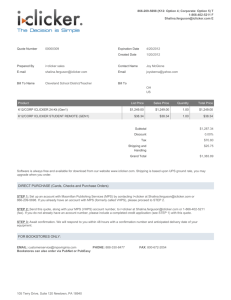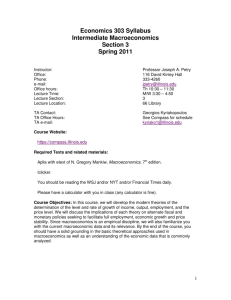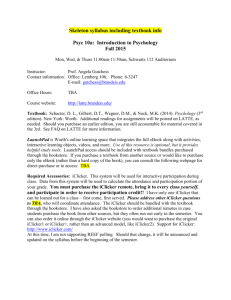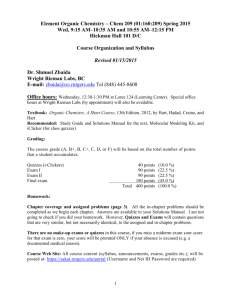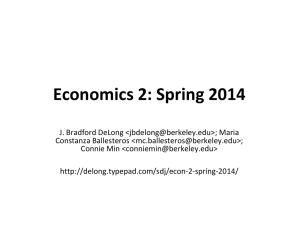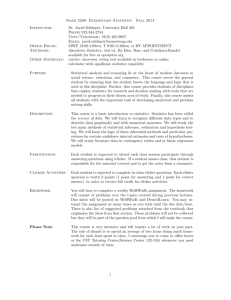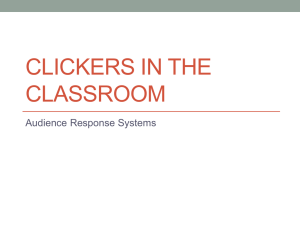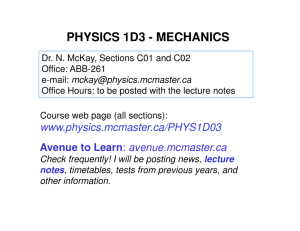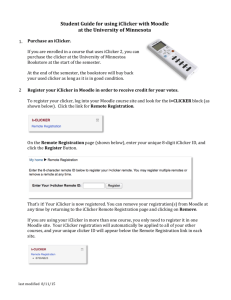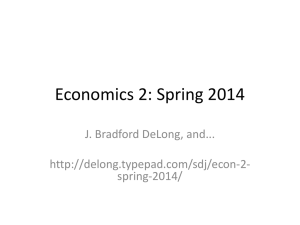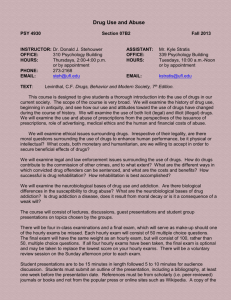Physics 212 - Spring 2012
advertisement
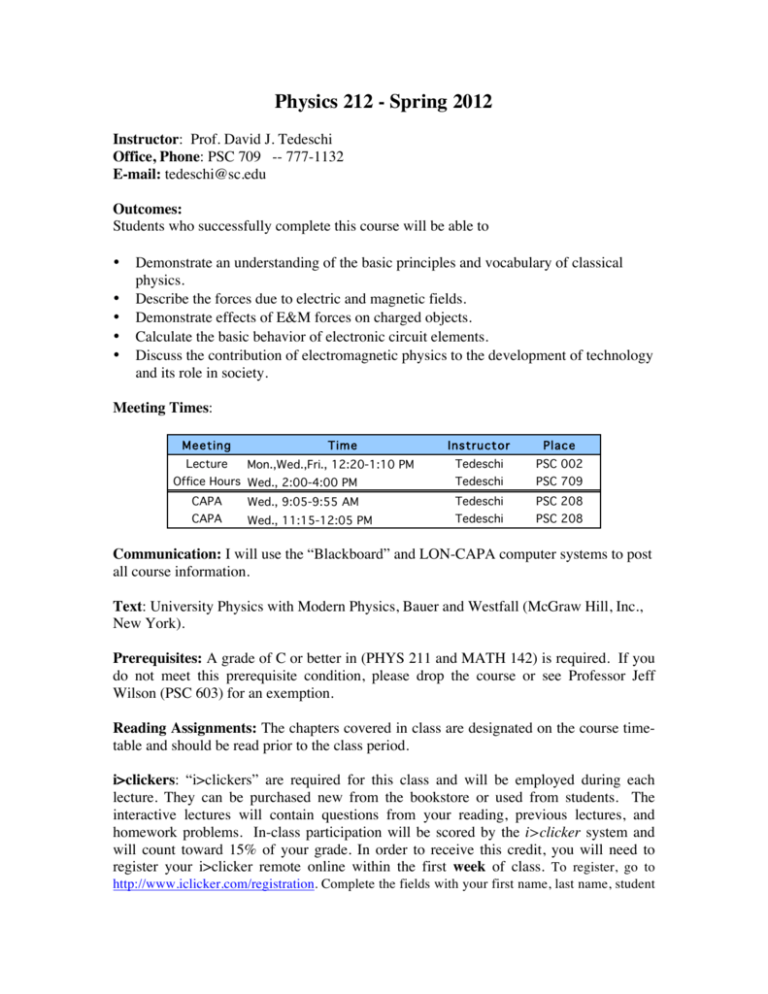
Physics 212 - Spring 2012 Instructor: Prof. David J. Tedeschi Office, Phone: PSC 709 -- 777-1132 E-mail: tedeschi@sc.edu Outcomes: Students who successfully complete this course will be able to • • • • • Demonstrate an understanding of the basic principles and vocabulary of classical physics. Describe the forces due to electric and magnetic fields. Demonstrate effects of E&M forces on charged objects. Calculate the basic behavior of electronic circuit elements. Discuss the contribution of electromagnetic physics to the development of technology and its role in society. Meeting Times: Meeting Lecture Time Mon.,Wed.,Fri., 12:20-1:10 PM Office Hours Wed., 2:00-4:00 PM Instructor Place Tedeschi PSC 002 Tedeschi PSC 709 CAPA Wed., 9:05-9:55 AM Tedeschi PSC 208 CAPA Wed., 11:15-12:05 PM Tedeschi PSC 208 Communication: I will use the “Blackboard” and LON-CAPA computer systems to post all course information. Text: University Physics with Modern Physics, Bauer and Westfall (McGraw Hill, Inc., New York). Prerequisites: A grade of C or better in (PHYS 211 and MATH 142) is required. If you do not meet this prerequisite condition, please drop the course or see Professor Jeff Wilson (PSC 603) for an exemption. Reading Assignments: The chapters covered in class are designated on the course timetable and should be read prior to the class period. i>clickers: “i>clickers” are required for this class and will be employed during each lecture. They can be purchased new from the bookstore or used from students. The interactive lectures will contain questions from your reading, previous lectures, and homework problems. In-class participation will be scored by the i>clicker system and will count toward 15% of your grade. In order to receive this credit, you will need to register your i>clicker remote online within the first week of class. To register, go to http://www.iclicker.com/registration. Complete the fields with your first name, last name, student id, and remote ID. Your student ID should be your USC network user name (your blackboard login). See http://www.iclicker.com for more information or contact the technical support line at 1.866.209.5698 or via email at support@iclicker.com. iClicker Grading: Your iClicker score is the percent of questions that you get correct. The “Q” value (see table below) is then factored in to the course formula to calculate your course score. For example: if you get 70% or better on “clicker” questions, you will get full credit (Q = 100) when computing your course score. iClicker Score 70-100% 50-70% 25-50% 0-25% “Q” Value 100 75 50 0 Homework: Problem sets are to be completed each week as designated on the course timetable and are due by 11:59 PM on Wednesdays. Answers will be made available the next day. The LON-CAPA homework system will be used. Since the computer records when you submit your answers, NO LATE HOMEWORK WILL BE ACCEPTED. Occasionally the network is slow or disabled, so plan ahead. Deadlines will not be changed due to network latency. Your homework grade will count towards 25% of your course score. You can login to the capa system using your USC network name and your student ID as your password. Once you select “2012 Spring, PHYS 212” as your course, you will see the homework assignments. Available CAPA servers: http://loncapa2.physics.sc.edu, http://loncapa4.physics.sc.edu If you have a technical problem with CAPA login, contact James Clawson at clawsonj@mailbox.sc.edu. Tests: CAPA-style tests will be given. The tests will consist of conceptual questions as well as problem solving questions. The average of all exams is worth 35% of your course score. The test days are all scheduled in advance, therefore, there is NO makeup for a missed exam. Final Exam: The final exam is comprehensive and will cover all material covered in class. The final counts towards 25% of your course score. All students must take the final exam. Attendance: Highly suggested. I adhere to the University policy on attendance (see http://www.sc.edu/bulletin/ugrad/acadregs.html). You will lose a full letter grade if you have “excessive” absences as defined by the policy. If you must miss a class due to official reasons, see me in advance. Reminder: there is no makeup for a missed exam. Cheating: Highly discouraged. Cheating is the wrong thing to do and will result in the maximum penalty. I consider bringing a fellow student’s i>clicker to class to be cheating and a violation of the University Honor Code. If you are caught with a remote other than your own or have votes in a class that you did not attend, you will forfeit all clicker points and may face additional disciplinary action. Electronics: Cell Phones, iPods, LapTops, etc… must be turned off and stowed away during class time. Use of unauthorized electronics during quizzes, tests, and exams will be considered cheating. Grading: Grading is based on the following formula that includes your clicker question score (Q), homework score (H), test average (T), and final exam score (F). Course Score = 0.15*Q + 0.25*H + 0.35*T + 0.25*F Course Score 90.0 - 100 88.0 - 89.9 78.0 - 87.9 76.0 - 77.9 67.0 - 75.9 65.0 - 66.9 55.0 - 64.9 00.0 - 54.9 Letter Grade A B+ B C+ C D+ D F Grading Example: iClicker – You get 56 out of 75 questions correct throughout the semester. Thus your iClicker score is 56/75=0.746 or 75%. Your Q value is 100. Homework – You get 198 out of 200 homework questions throughout the semester. You would then have a homework score of 198/200=0.99 or 99%. Tests – You score a 45 out of 50 on test 1, 37 out of 37 on test 2, and 32 out of 34 on test 3. Your test average would be (45/50 + 37/37 + 32/34) / 3 = 0.947 or 94.7%. Final exam – You score 82 out of a possible 96 points. Your score is 82/96=0.85 or 85%. Course Score: C=0.15*(100)+0.25*(99)+0.35*(94.7)+0.25*(85)=94.1 (A)
